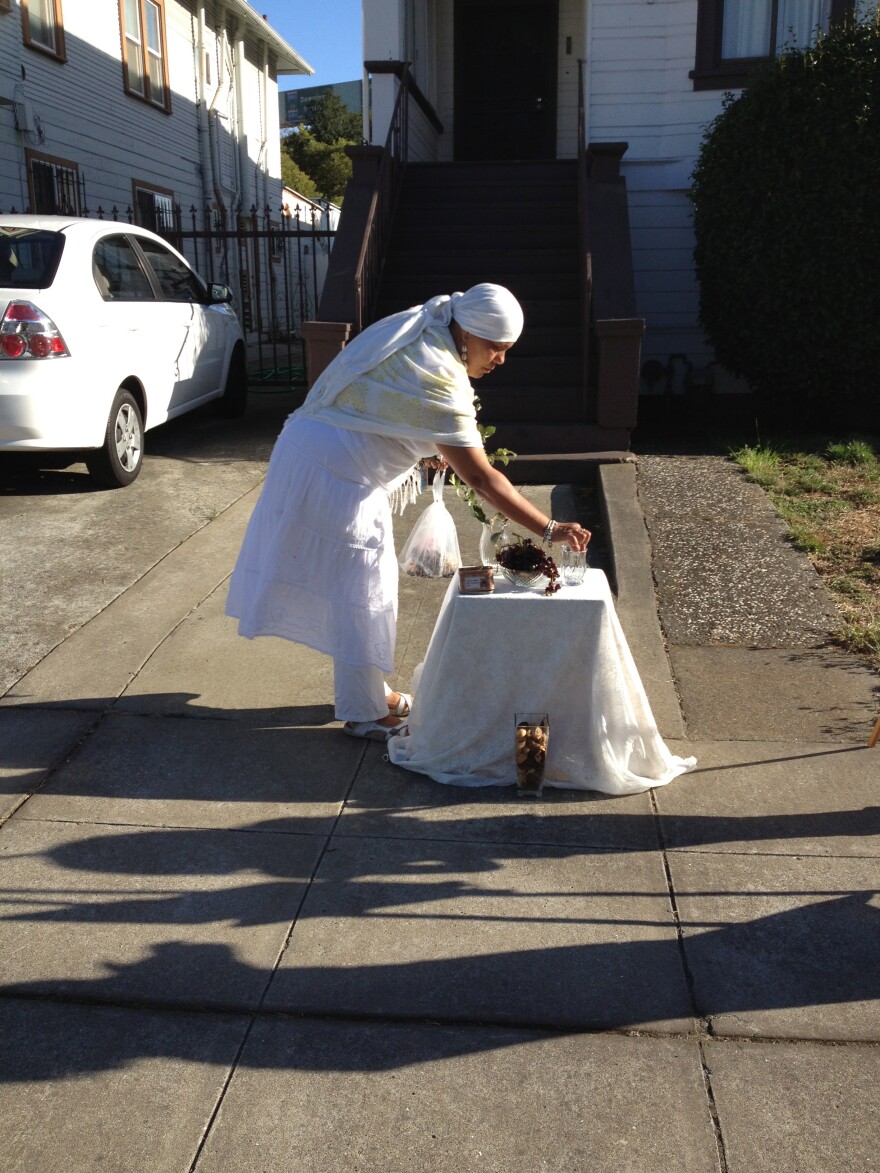It's a sunny, busy afternoon on the plaza at the Fruitvale BART station. A crowd of about 30 people are gathered to listen to a young woman singing an old song.
"Mama may have, Papa may have, but God bless the child who's got its own...."
Passersby pause to see what's going on-- some walk on, and some stay to become part of the audience. As the young woman sings, candles are lit to form a square on the concrete just behind her. Then a community elder pours libation-- a traditional African form of prayer.
An older woman in a brown dress steps gently into the square of candles and begins to hum. As a bus pulls away from the curb nearby, she begins to speak.
“Oscar was born February 26th, 1987. His grandfather and I helped raise him.”
The woman, Ayodele Nzinga, is an actor, but she’s performing the words of a real person: Bonnie Johnson, who is the grandmother of Oscar Grant. He was the young man who was shot and killed right here, on New Year’s Day in 2009.
Nzinga speaks about Oscar as a young child, as a young man, and as a father. She describes the pain and anger that followed his death, and how her faith helps her to find peace. Then she sings a gospel tune.
“So build your hope on things eternal, and hold on to God’s unchanging hand...”
The Love Balm Project
Writer and director Arielle Julia Brown commissioned this work for her project called “Our Hallowed Ground - The Love Balm Project”. It’s a series of performances based on testimonies of Bay Area mothers and grandmothers who have lost children to violence. Each testimony is performed in the very places where the young people were killed.
Brown says the project was partly inspired by a trip to Rwanda. She went there in 2010 with playwright Erik Ehn, who is well-known for using art as a tool to address trauma and violence. While there, she learned about Rwanda’s community court system called gacaca. It was set up to deal with the aftermath of the 1994 genocide. The courts took the form of community meetings, often held outdoors, in a circle. Perpetrators and survivors would each speak openly about what happened.
Brown says it was a powerful experience to witness this kind of open dialogue. “The perpetrator is no longer just in your head,” she says. “The perpetrator is there, in person … And you have the opportunity to speak.”
At the same time back home, the trial of Johannes Mehserle was happening-- he was the BART police officer who shot Oscar Grant. Arielle Brown grew up going to church with Grant, and his grandmother Bonnie Johnson is also her godmother.
Brown says she became uncomfortable with the distance between her memories of Oscar Grant the person, and the symbol he had become.
“I have those memories of him,” she says. “And then he became this frozen-in-time 22 year old black man shot on a BART platform. I was working through memory and how memory served here and worked politically and in the justice system.”
She wanted to find a way to address these feelings in her theater work, and was inspired by what she had learned in Rwanda. So, starting with her own godmother, she interviewed women who had lost children to violence. In 2012, she created a stage play based on their words, performed by professional actors. This year the project expanded to these site-specific pieces.
“There’s just so many community members who are specifically impacted by each of these narratives, that have not come to a traditional theater space to see the work,” she says. She wanted to bring the pieces to people where they already were.
Remembering and Witnessing
On a residential block in North Oakland, performer Ayanna Davis—known in her community as Mama Ayanna --is preparing for a performance. She lights incense, places candles and pictures on the ground, and sets up a small altar on a side table.
Davis is performing her own testimony today, on the street where her son Khatari Gant was murdered six years ago. Her voice is strong and clear, but at times she seems overcome by emotion as she performs the words she has written.
"I am forever striving against the desire to call Khatari back, to call back his last breath. The wanting of his life, the need for fulfillment of his dreams, the desire for the unborn grandchildren, the witness to love that would have brought them forward, and given itself to new generations..."
Davis is the only mother in the Love Balm Project who is performing her own words. She says she approached the performance as an opportunity to share her writing, but also as a form of personal healing.
“I’m one of those people who, I move into the fire,” Davis says. “If something creates…apprehension, to move through the apprehension of these emotions. Because every day, it’s there for you. It doesn’t go away.”
Arielle Brown wants these emotions to stay with the audience as well. And for people to remember that violent acts may have happened right where they live. Brown says that when she was in Rwanda, she was struck by how publicly Rwandans commemorated the people lost to genocide.
“You would see a banner. And then it would say, ‘This many people were killed here, this is the incident that happened here.’ And that’s just not within our culture here.”
Brown wants to change that, even if it makes people uncomfortable. Through her work, she wants to remind us that witnessing violence is a political act, and that we can choose not to turn away.


